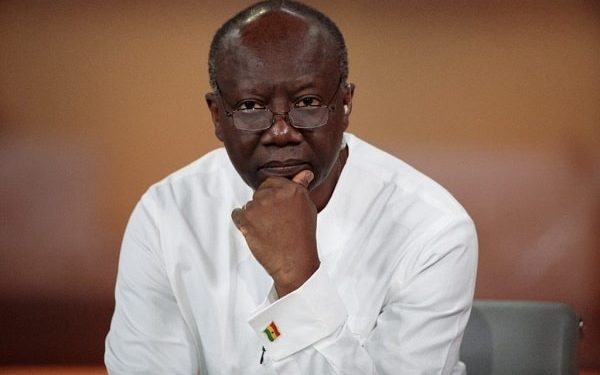Climate-conscious industrialization and digitalization, according to Mr Ken Ofori-Atta, Minister-designate of Finance, are critical to Africa’s recovery and systemic transition of economies.
He said that Africa’s industrialization was beneficial not only to Africa but also to the rest of the world.
Mr. Ofori-Attah was speaking at the ECA Conference of African Ministers of Finance, Planning, and Economic Development’s 53rd Session on the subject “Africa’s Sustainable Industrialization and Diversification in the Digital Era in the Form of COVID-19,” which lasted two days.
The ECA organized the simulated conference, which was broadcast live by the Ghana News Agency.
Mr Ofori-Atta described the occurrence as his “first day back” in office and his “first foreign engagement” after a harrowing medical care for COVID complications.
He said Africa had shown incredible strength in the face of adversity, successfully containing the global pandemic’s initial surge, despite a 2.1 percent GDP contraction relative to a 3.5 percent global GDP contraction.
However, he said that the second wave had exhausted buffers at a time when markets were weakening and diseases and deaths were skyrocketing.
This innovations are putting a strain on our health-care services. As a consequence, Africa’s Real GDP is expected to rise by 3.4 percent in 2021, relative to a global growth rate of 5.5 percent.
He said that the COVID-19 crisis had caused political, economic, and social upheavals, which had radically altered the conventional decision-making framework.
“Unless we have our build-back plan correct, we are facing the possibility of unequal economic development for Africa,” Mr Ofori-Atta said.
“We need to prioritize building resilience, identifying alternative funding models to promote sustainable recovery, stimulating domestic manufacturing capacities to generate employment, and mitigating global supply-chain threats now more than ever,” says the president.
He stressed the importance of optimizing African convergence and geographic supply chains, as well as scaling digital transformation and inclusive innovation.
Read Also: GNECC advises the Ministry of Education to introduce textbook publishing regulations
Africa would have a fifth of the world’s people, more than half of the world’s children, and $29 trillion in GDP by 2050. As a result, it is in everyone’s best interests for Africa to prosper.
“Our path to beating this pandemic will make the difference between a wasted decade and a fast turnaround that sets us on a balanced growth trajectory,” said the Finance Minister.
He said Ghana’s indigenous approach to achieving this change was the GH 100 billion (USB 17 billion) Ghana CARES “Obaatanpa” scheme, which is a three-year revival program aiming to transform, revitalise, and modernize the economy and will be financed 30% by the government and 70% by the private sector.
The aim is to encourage and recruit trained young people into commercial farming, as well as to develop the country’s light manufacturing industry, which will focus on agro-processing and food import substitution, pharmaceuticals, and textiles and garments sub-sectors.
It also aims to grow engineering/machine tools and ICT/digital economy sectors, as well as accelerate digitalisation and develop Ghana’s housing and building sector to help local construction firms.
Much of this is based on the general population’s willingness and commitment to “play their part” and change the national narrative from survival to stability, showing that creating internal resilience on the African continent takes us closer to an Africa Beyond Aid.”
Mr Ofori-Atta stated that Africa would concentrate on improved vaccine and COVID-19 protocols, noting that as of March 21, Africa’s vaccination rate per 100 population was 0.6 percent, relative to 3.4 percent in Asia, 6.4 percent in South America, 13 percent in Europe, and 23 percent in North America.
Climate change, COVID-19, and the economic slowdown, according to Dr Vera Songwe, Executive Secretary of the Economic Commission for Africa (ECA), have combined to create a triple crisis for Africa.
“Following the latest G7 finance ministers conference, there is now real support for joint action on SDRs at the IMF and World Bank spring meetings, which we welcome.”
“There has been a decoupling of the world’s reaction between developed and emerging countries,” she said. The advanced economies responded quickly to shore up their economies by pumping trillions of dollars into the system. Vaccines, access decoupling, and monetary policies are also on the table. The SDRs are the gateway to solutions for developing and frontier markets to move ahead and narrow these gaps.”
Africa, according to Dr. Songwe, is already in the answer process. She said it required liquidity to transition from reaction to recovery, as well as an extension of the DSSI until the end of the year, and that new SDRs were desperately needed.
“As the developing world shifts from reaction to recovery, Africa must not be left behind,” she added, adding that the continent’s recovery must emphasize employment growth and green jobs.
Poverty levels are rising, which could contribute to “lower for longer” poverty traps, jeopardizing previous progress.
This, according to Dr. Songwe, suggested that more money had to go to the private sector and small and medium-sized businesses, which are the backbone of Africa’s economy. She went on to say that countries must implement changes that would enable them to do so.
According to her, most African countries are expected to lose between 2% and 5% of their GDP due to climate change by 2030, with up to 9% of that lost due to climate-related natural disasters in 2019.
According to ECA, between 49 and 161 million Africans have plunged into hardship as a result of COVID-19, with 100 million being the most possible scenario.
SOURCE: ATLFMONLINE

























